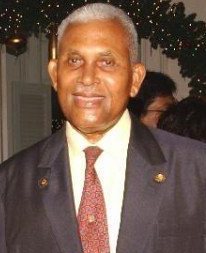A. N. R. Robinson facts for kids
Quick facts for kids
A. N. R. Robinson
SC OCC TC
|
|
|---|---|
 |
|
| 3rd President of Trinidad and Tobago | |
| In office 18 March 1997 – 16 March 2003 |
|
| Prime Minister | Basdeo Panday Patrick Manning |
| Preceded by | Noor Hassanali |
| Succeeded by | George Maxwell Richards |
| 3rd Prime Minister of Trinidad and Tobago | |
| In office 18 December 1986 – 17 December 1991 |
|
| President | Ellis Clarke Noor Hassanali |
| Preceded by | George Chambers |
| Succeeded by | Patrick Manning |
| 1st Chief Secretary of Tobago | |
| In office 4 December 1980 – 16 December 1986 |
|
| Deputy | Jefferson Davidson |
| Preceded by | Inaugural holder |
| Succeeded by | Jefferson Davidson |
| Personal details | |
| Born |
Arthur Napoleon Raymond Robinson
16 December 1926 Scarborough, Tobago, Trinidad and Tobago |
| Died | 9 April 2014 (aged 87) Port of Spain, Trinidad and Tobago |
| Nationality | Trinidadian and Tobagonian |
| Political party | People's National Movement Democratic Action Congress National Alliance for Reconstruction |
| Spouse | Patricia Robinson |
| Alma mater | University of London Oxford University |
Arthur Napoleon Raymond Robinson (16 December 1926 – 9 April 2014), also known as A. N. R. or "Ray" Robinson, was an important leader in Trinidad and Tobago. He served as the third President from 1997 to 2003. Before that, he was the third Prime Minister from 1986 to 1991.
He is famous for suggesting the idea that led to the creation of the International Criminal Court. This court helps to bring justice for serious international crimes. Robinson was the first active politician to become President of Trinidad and Tobago.
Contents
Early Life and Education
Arthur Napoleon Raymond Robinson was born in Tobago in 1926. His parents were James and Isabella Robinson. He went to Castara Methodist School, where his father was the head teacher. He also attended Bishop's High School.
He studied law and earned a degree from London University. In 1951, he moved to the United Kingdom. There, he became a lawyer and studied philosophy, politics, and economics at Oxford University. After his studies, Robinson returned to Trinidad and Tobago to work as a lawyer.
Robinson married Patricia Rawlins. They had two children, David and Ann-Margaret.
Political Career
Robinson was one of the first members of the People's National Movement political party. From 1958 to 1960, he served in the parliament of the West Indies Federation. In 1961, he was elected to the Parliament of Trinidad and Tobago as a representative for Tobago. He was the country's Minister of Finance from 1961 to 1966.
In 1970, Robinson left the People's National Movement. He then started his own group called the Action Committee of Dedicated Citizens. This group later joined with the Democratic Labour Party for the 1971 elections. However, Robinson and his party decided not to take part in those elections.
After 1971, his group became the Democratic Action Congress. In the 1976 elections, this party won both seats in Tobago. As the leader, Robinson worked hard for Tobago to have more control over its own affairs. This led to the Tobago House of Assembly Act in 1980. Robinson then became the Chairman of the Tobago House of Assembly.
In 1981, Robinson joined forces with other political leaders to form the National Alliance for Reconstruction. This new party won the 1983 local elections. Building on this success, the four parties officially combined to form the National Alliance for Reconstruction.
A. N. R. Robinson became Prime Minister through the National Alliance for Reconstruction. He later lost the 1991 elections. He then joined the UNC Administration as part of a coalition. He was later nominated to become the next President of Trinidad and Tobago.
International Criminal Court
Robinson played a very important role in creating the International Criminal Court. In 1989, he asked two legal experts, Benjamin Ferencz and Robert Kurt Woetzel, to help draft a proposal. This proposal was for the United Nations General Assembly to study the idea of creating an International Criminal Court.
Trinidad and Tobago presented this idea to the UN General Assembly in June 1989. This led to the adoption of the Rome Statute of the International Criminal Court in July 1998. The International Criminal Court officially started on 1 July 2002.
1990 Coup Attempt
In 1990, there was an attempt to overthrow the government by a group called the Jamaat al Muslimeen. During this time, Robinson and many of his cabinet members were held hostage for six days. When he was told to order the army to stop fighting, Robinson bravely told them to "attack with full force." This act of courage led to him being harmed by his captors. He was also shot in his leg.
Illness and Death
Robinson had several health problems, including a stroke. He passed away on 9 April 2014, at the age of 87, after being ill for several months. The Prime Minister at the time, Kamla Persad-Bissessar, said he was "one of our nation's outstanding sons." She added that his legacy would continue to inspire future generations.
Honours and Recognition
In 1997, Robinson received the Trinity Cross, which was the highest award in Trinidad and Tobago at that time.
In May 2011, the airport in Tobago was renamed the Arthur Napoleon Raymond Robinson International Airport in his honour. Before this, it was known as Crown Point International Airport.
In November 2011, A. N. R. Robinson received Tobago's highest award, the Tobago Medal of Honour.
See also
 In Spanish: Arthur Robinson para niños
In Spanish: Arthur Robinson para niños
 | Dorothy Vaughan |
 | Charles Henry Turner |
 | Hildrus Poindexter |
 | Henry Cecil McBay |

